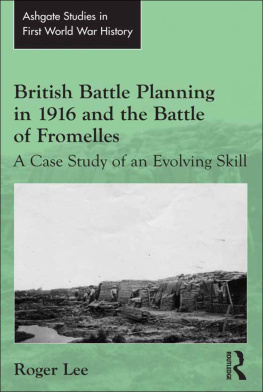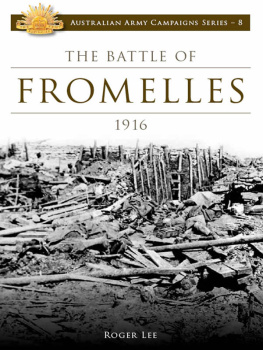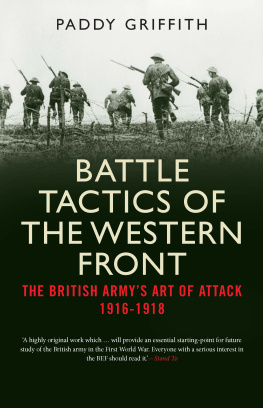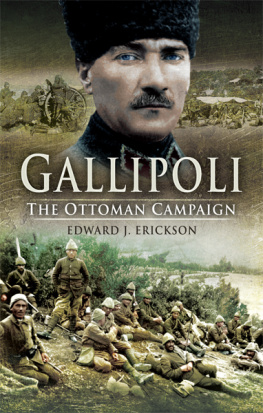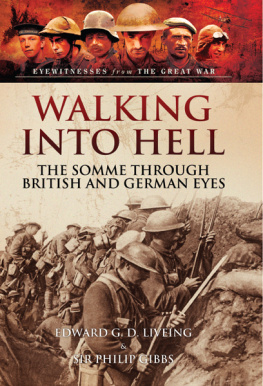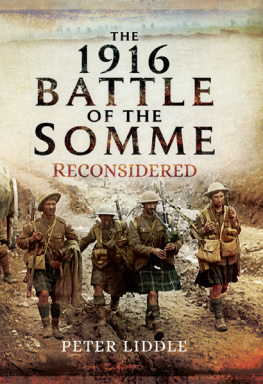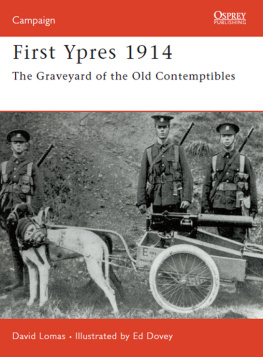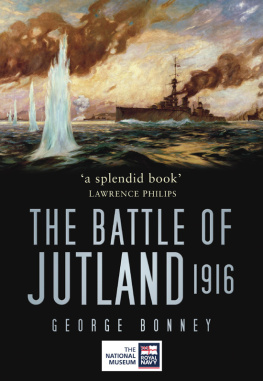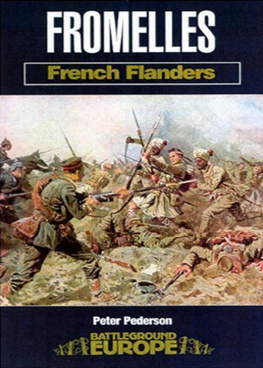BRITISH BATTLE PLANNING IN 1916 AND THE BATTLE OF FROMELLES
Ashgate Studies in First World War History
Series Editor
John Bourne
The University of Birmingham, UK
The First World War is a subject of perennial interest to historians and is often regarded as a watershed event, marking the end of the nineteenth century and the beginning of the modern industrial world. The sheer scale of the conflict and massive loss of life means that it is constantly being assessed and reassessed to examine its lasting military, political, sociological, industrial, cultural and economic impact. Reflecting the latest international scholarly research, the Ashgate Studies in First World War History series provides a unique platform for the publication of monographs on all aspects of the Great War. Whilst the main thrust of the series is on the military aspects of the conflict, other related areas (including cultural, political and social) are also addressed. Books published are aimed primarily at a post-graduate academic audience, furthering exciting recent interpretations of the war, whilst still being accessible enough to appeal to a wider audience of educated lay readers.
Also in this series
British Infantry Battalion Commanders in the First World War
Peter E. Hodgkinson
New York and the First World War
Shaping an American City
Ross J. Wilson
An Historian in Peace and War
The Diaries of Harold Temperley
Edited by T.G. Otte
A Student in Arms
Donald Hankey and Edwardian Society at War
Ross Davies
British Battle Planning in 1916 and the Battle of Fromelles
A Case Study of an Evolving Skill
ROGER LEE
Australian Army History Unit
First published 2015 by Ashgate Publishing
Published 2016 by Routledge
2 Park Square, Milton Park, Abingdon, Oxon OX14 4RN
711 Third Avenue, New York, NY 10017, USA
Routledge is an imprint of the Taylor & Francis Group, an informa business
Copyright Roger Lee 2015
Roger Lee has asserted his right under the Copyright, Designs and Patents Act, 1988, to be identified as the author of this work.
All rights reserved. No part of this book may be reprinted or reproduced or utilised in any form or by any electronic, mechanical, or other means, now known or hereafter invented, including photocopying and recording, or in any information storage or retrieval system, without permission in writing from the publishers.
Notice:
Product or corporate names may be trademarks or registered trademarks, and are used only for identification and explanation without intent to infringe.
British Library Cataloguing in Publication Data
A catalogue record for this book is available from the British Library
The Library of Congress has cataloged the printed edition as follows:
Lee, Roger (Military historian)
British battle planning in 1916 and the Battle of Fromelles : a case study of an evolving skill / by Roger Lee.
pages cm. (Ashgate studies in First World War history)
Includes bibliographical references and index.
ISBN 978-1-4724-4995-5 (hardcover) ISBN 978-1-3155-7007-5 (ebook)
ISBN 978-1-3171-7211-6 (epub) 1. Fromelles, Battle of, Fromelles, France, 1916. 2. Military planning Great Britain History 20th century. I. Title.
D762.F76L44 2015
940.4272--dc23
2014038146
ISBN: 9781472449955 (hbk)
ISBN: 9781315570075 (ebk-PDF)
ISBN: 9781317172116 (ebk-ePUB)
Foreword
The action at Fromelles in July 1916 was, until very recently, largely unknown to the general public. That was all changed by archaeological excavations at Pheasant Wood that uncovered a mass grave, somehow overlooked during the clearing of the battlefield in the aftermath of the war. In Australia, and to a lesser extent in the UK, Fromelles has joined the litany of names such as the Somme and Passchendaele that are invoked when the horrors of the First World War are recalled. The fact that, of the two formations involved, it was the 5th Australian Division rather than the 61st British Division that sustained the higher casualties has given ammunition to those who see the digger as the victim of incompetent British generalship. Setting aside issues of identity the diggers of July 1916 would have regarded themselves as both Australian and in some sense British concentration on national narratives obscures a bigger and more important question: what does Fromelles tell us about the capabilities and effectiveness of the British Expeditionary Force at that period of the war? In this important study, Roger Lee analyses one highly significant but previously neglected aspect of this large topic battle planning. This, Lee defines as the timetable of events and preparations intended to provide the attacking infantry with the greatest possible chances of success. Applying this definition to post-Fromelles battles, one needs to add other arms notably armour to the mix.
Lee brings a wealth of relevant experience to the subject. As head of Australias Army History Unit, he deals with military practitioners on a day-to-day basis, and his understanding of modern doctrine and staff work informs his analysis of the planning of nearly a century ago. He is, however, far too good a historian to simply read back modern practice into the past in a crude and anachronistic fashion. Nevertheless, Lees empathy and insights into the planning process means he rejects blanket accusations of incompetence and stupidity. The result is a nuanced and intellectually satisfying study.
In general, issues of command and staff work have attracted few writers, and this is the first serious study of the BEFs planning process. It is not difficult to see why. The subject lacks the superficial glamour of much popular military history and involves lengthy and patient archival research. It is also a technical subject, which helps explain why, when non-specialist historians discuss it, they often get it badly wrong. As he correctly argues, while the BEFs planning for battle is frequently criticised, it is rare to find the term planning adequately defined if it is defined at all. That is why Lees study is so important. By identifying and analysing the planning process that connected high command to the front line, he fills in the gaps between the broad, big hand on small map directives and the infantry climbing out of their trenches to attack the enemy.
Fromelles was chosen as a case study, in part because it was a relatively small scale operation and thus of a manageable size. However he provides a model that could, with profit, be applied to other, much larger battles: Loos, the Somme, Third Ypres and Amiens, to name a few. These operations would undoubtedly provide a challenge because of the number of formations involved and the sheer amount of documentary material available. Nonetheless, if we are truly to understand these battles, this is precisely the sort of work that needs to be carried out.
As well as being an important contribution to our understanding of how in general the BEF operated on the Western Front, this is a weighty contribution to the debate on the Battle of Fromelles. Roger Lee brings cool, reasoned analysis to a topic which has tended to generate heat rather than light. His views, particularly that Fromelles was operationally successful, will not please everyone. Marshalling a formidable array of evidence in support of his case, he argues that while the planning for the battle contained some flaws, the principal cause of the [tactical] failure of the attack was the failure of the combat troops implementing the plan. Moreover, given the inexperience of the commanders and staff, Australian and British infantry, supporting artillery and combat support and supply troops, this conclusion should surprise no one. Alongside some obvious mistakes in the planning process the worst was placing the divisional boundary on the middle of the Sugar Loaf, thus failing to ensure that the capture of this key feature was the responsibility of a single formation and causing unnecessary confusion need to be set the success of logistic arrangements and the fact that designated supporting artillery was in place, among myriad other facets of the planning process. The significance of Clausewitzian friction, not least the lack of time to calmly reflect and plan, has been underplayed by many previous writers on Fromelles. Lee does not make that mistake.

